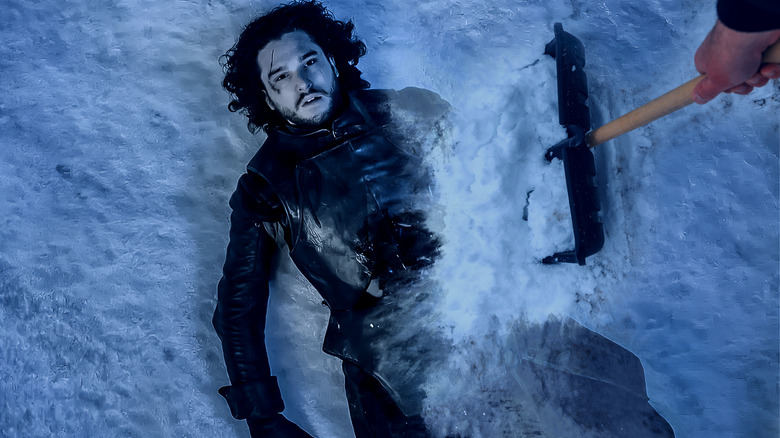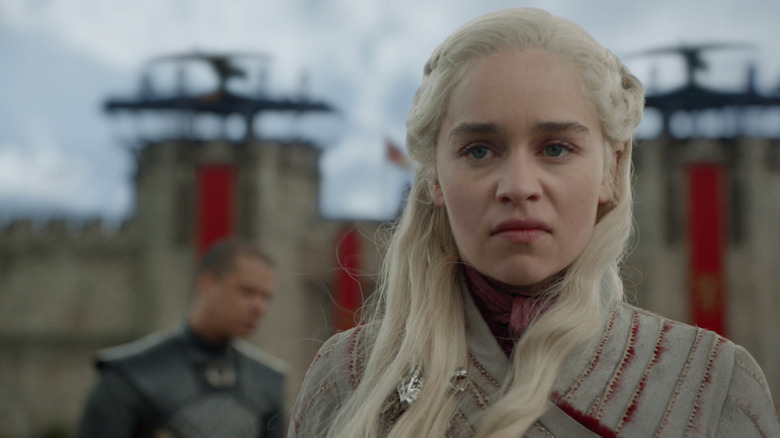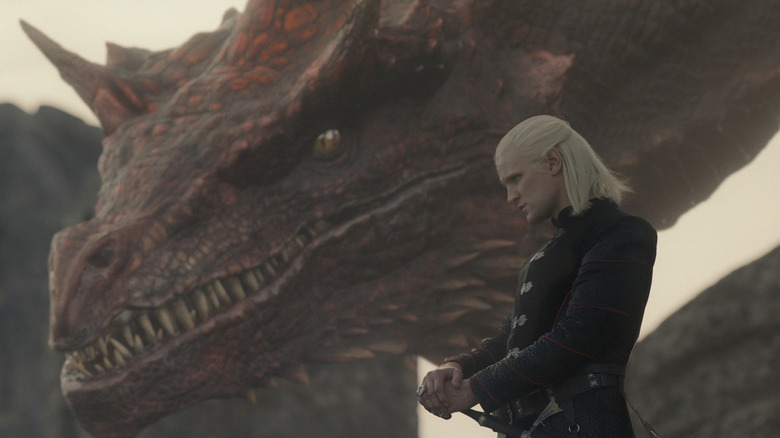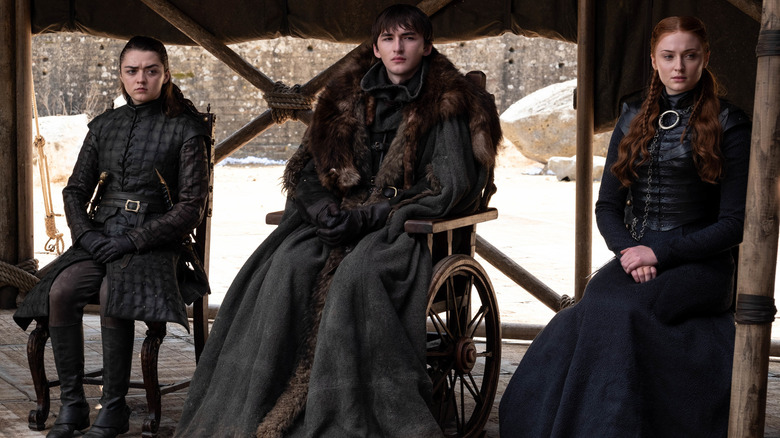Westeros Needs To Leave The Jon Snow Spin-Off In The North And Move On To Greener Pastures
Not that long ago, HBO's gripping adaptation of George R.R. Martin's acclaimed "A Song of Ice and Fire" series enthralled a global fanbase with stunning plot twists, unflinching violence, and a stellar array of talented cast members. For year after year, fans actively engaged in wild speculation about future episodes ... until the shortened mess of a final season ruined its legacy.
The now-infamous tale of what went wrong with "Game of Thrones" is a cautionary one for all storytellers. Move the blundering Starbucks cup aside, and you'll find one of the most disappointing television finales in the history of the medium, that even resulted in a lengthy petition to remake it. If you've ever wondered how one fumbles a global phenomenon, critical darling, and colossal Emmy juggernaut, in such a spectacular way ... well, it's through a perfect storm of mismanagement, led by a race to the end at dragon flight speed.
This failure proved to be a huge obstacle in HBO's desire to build out a George R.R. Martin TV universe. After the underwhelming finale, the tarnished brand name attempted a series of failed spin-off ideas until finally hitting the mark with the fiery prequel "House of the Dragon."
Don't believe it's going to end there, though. HBO has already greenlit a sequel series to the original "Game of Thrones," which will feature Jon Snow (Kit Harington) back in the spotlight. As much as fans might love Jon, this notion is leaving shivers down the backs of many viewers, as it inevitably reopens the still-infected wound that is the "Game of Thrones" finale. With that in mind, HBO should leave this idea buried in the snow.
Don't underestimate how angry people still are about the end of Game of Thrones
When the final season of "Game of Thrones" premiered, the anticipation was at an all-time high. Numerous exciting plot points were finally about to be epically resolved. What could possibly go wrong? Well ... a lot, apparently. Though George R.R. Martin consistently primed us for what he called a "bittersweet ending," we couldn't have anticipated the disappointment showrunners David Benioff and D.B. Weiss had in store.
Season 8 fittingly began with nostalgic callbacks before quickly falling to pieces. "The Long Night" showed fans the long-awaited battle against the fearsome Night King (Vladimir Furdik) and his army of the undead, but fans could barely see anything because of poor lighting. From there, one letdown piled on top of another, culminating in a rushed finale that permanently damaged the legacy of Daenerys Targaryen (Emilia Clarke) and left the complex, nuanced narratives of the past behind in favor of outdated tropes.
What happens next? Well, who cares? Because the right timing to launch a sequel series, frankly, is still years away. People were passionate about this world, and a cut this deep takes time to heal — which can't be done if HBO is so quick to dive back into the life of Jon Snow, a character inextricably linked with how it all went down. Furthermore, what sort of storylines could Jon have in store for him, other than keeping him isolated from the grander goings-on and rehashing the Free Folk stuff from Season 3? The barren cold won't fix the underwhelming finale, and will instead ice fans out even more.
House of the Dragon proves distance and time are key
That's not to say this universe can't continue. After all, the riveting and refreshing prequel "House of the Dragon" has warmed fans with hope and memories of how great "Game of Thrones" was at its peak. With a new cast and over a century between the new story and the original, "House of the Dragon" has wildly succeeded in viewership numbers and secured a Season 2 renewal.
"House of the Dragon" also unveiled a perfect approach to continue the world of Westeros by highlighting one key detail: distance from the original narrative is crucial. The prequel builds on the core elements that made "Game of Thrones" successful, while creatively charting a path of its own. It balances castle espionage with blood-thirsty pursuits, traitorous acts, and fire-breathing dragons galore, without overly leaning on the original series, and having no characters shared between both shows — that is, the prequel draws upon viewer familiarity with the use of ancestor characters, while avoiding direct connections, and provides further context for the world our "Game of Thrones'" favorites occupy. This fine line between past and present is integral to the future success of the franchise.
In comparison, a Jon Snow sequel would inevitably be a constant reminder of the muddled mess we got in Season 8. The continuation would need to consistently reference past events we'd rather not relive to establish a story of its own. Additionally, "House of the Dragon" has weakened Jon's character by highlighting the Prince That Was Promised prophecy that "Game of Thrones" failed to deliver on, giving the series another yet another insurmountable challenge to overcome.
Of all the characters left alive in Season 8, why center around Jon?
For all the bad conclusions in the "Game of Thrones" finale, Jon's actually makes sense for him. His honorable ending puts him back in a familiar territory (doing what he'd probably rather be doing than ruling Westeros, frankly), accompanied by his friends and on the way to exciting new adventures.
Which begs the question: why him? Bran (Isaac Hempstead Wright) is now the omniscient King of Westeros with Tyrion (Peter Dinklage) at his side as Hand. Surely this duo would make a far more exciting continuation than the winter wasteland we've already seen so much of? Or look east, to Arya's (Maisie Williams) sailing expedition around the world as a trained assassin. If we need to return North, why not with Sansa (Sophie Turner) and her rightful reign over Winterfell?
Naturally, the "Game of Thrones" cast has mixed feelings about returning, which could prove to be an obstacle. However, Maisie Williams made it clear to People that Arya has a lot of story left to tell, so that's one open possibility. It's also possible that the Jon Snow spin-off has already been shelved, as George R.R. Martin revealed on his blog that a few spin-off ideas have met that fate. Regardless, the point is that from here on out, any "Game of Thrones" spin-offs need to truly exist in their own niche, and Jon Snow might be the character least capable of doing that.



